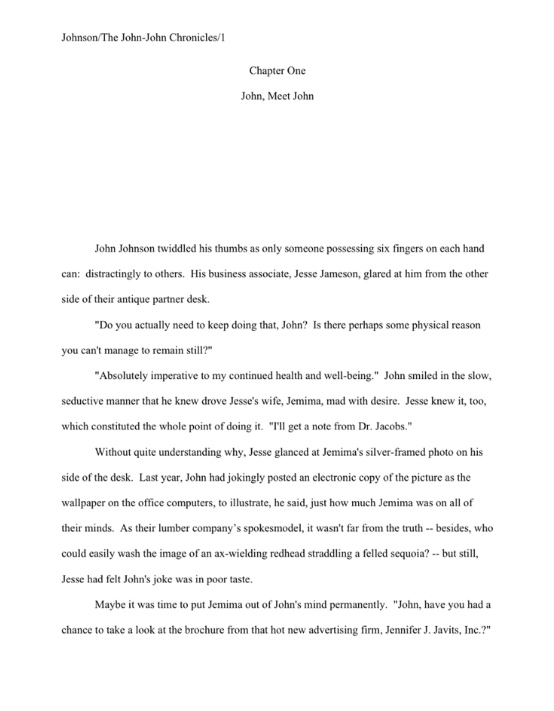
Gee, I bet you can’t tell which naming bugbear I’m going to tacking today. Normally, I try to make my titles a trifle more subtle, but as I’m still feeling a bit punk, as my dear old white-headed mother says, I’m going to cut myself a little slack and get right in your face about it: today, we’re going to be talking about proper name repetition.
As in the particularly sterling example above. Amongst Millicents, submissions (and first drafts in general) are notorious for this type of redundancy. Also notorious in her circles: the overuse of the character name John. And Jon. And Jack.
I just mention. Oh, and by notorious, I mean annoying for the reader.
It’s interesting how much of our discussion of character names has centered on ways improper use can annoy readers, isn’t it? For the last couple of posts, I’ve been harping on how too many named characters can make your submissions slightly harder to read — and thus annoying to Millicents all across New York — but too-frequent repetition of the main characters’ names makes the average editor rend her garments and the garden-variety agent moan.
If it’s any consolation, they’ve been rending and moaning for years. Pros used to attribute this problem to the itsy-bitsy computer screens that writers were working upon – remember the early Macintoshes, with those postcard-sized screens? They weren’t even tall enough to give a life-sized reflection of an adult face. If you made the text large enough to read, the screen would only hold a dozen or so lines.
But as technology has progressed, the screens on even inexpensive computers have gotten rather large, haven’t they? Even on a laptop, you can usually have a view of half a page, at least. My extra-spiffy editor’s monitor can display two life-sized manuscript pages side by side.
So why is it that writers so seldom have a clear idea of how distracting name repetition can be on a printed page? Is it merely that writers christen their major characters with their favorite names (including John, as likely as not), and want to see them in print again and again?
Not entirely. Partially, I think, it has to do with how differently the eye reads text on a backlit screen: it definitely encourages skimming, if not great big leaps down the page. But for the most part, I believe it has to do with how infrequently writers read their own work in hard copy.
Hear that Gregorian-like chanting floating through the ether? That’s every writer for whom I’ve ever edited so much as a paragraph automatically murmuring, “Before submission, I must read my manuscript IN ITS ENTIRETY, IN HARD COPY, and OUT LOUD.” Writers who read this blog religiously have been known to mutter this inspiring little rule of thumb in their sleep.
So yes, I admit it: I’m a broken record on this subject. But for some very, very good reasons.
For our purposes today, the reason really couldn’t be better: reading in hard copy — which is how virtually any editor, most agents, and 100% of contest judges will be seeing your submissions, right? — makes patterns in the text far more apparent to the reading eye.
Like, say, character name repetition. Lookee:

See how your eye tries to leap from one J to the next? As I mentioned a few days ago, the skimming eye is automatically attracted to capital letters in a text.
That’s why, in case you were wondering, not-especially-literate people tend to Capitalize Words for Emphasis. (When they’re not placing words that no one has ever said aloud inside quotation marks — another widespread editorial pet peeve.) It’s technically ungrammatical, but it definitely does the job of soliciting attention.
Proper names do jump off the page — which can be a good thing, if a manuscript is crammed to the gills with action, unnamed characters, and other literary titivations that do not involve the protagonist. Yet since most novels and pretty much all memoirs deal with their respective protagonists on virtually every page, it isn’t precisely necessary to keep calling attention to the protagonist by referring to him by name.
Especially within the dialogue of a two-person conversation. Unless the one of the characters happens to have multiple personalities, it’s generally assumed that the names of the conversants will not alter substantially within the course of a few pages of dialogue — but you’d never know that by the number of times some manuscripts have their discussants call one another by name.
In dialogue where the use of tag lines (he said, she said) has not been minimized, the repetition can become so frequent that it’s like a drumbeat. As in:
“I don’t think that’s fair of you, Eve,” Abigail snapped.
“Why ever not?” Eve asked.
“Oh, don’t be disingenuous with me Eve. I’ve known you too long.”
Eve played with a nearby paperweight. Was she testing its weight for throwing. “Honestly, Abby, I haven’t the slightest idea what you’re talking about. Unless this is about John?”
“Of course it’s about John,” Abigail huffed. “How many husbands do you think I have?”
“Just one,” Eve said, smiling. “It’s been just John since the seventh grade.”
Abigail’s eyes stung for a moment. Eve always had known how to push her buttons. “Don’t change the subject, Evie. Next, you’ll be reminiscing about that time we hanged our classmate when we were in the fourth grade.”
Eve sighed. “Those were the days, eh, Abby?”
“I’ll say,” Abigail said, edging out of paperweight-tossing range. “She should have known better than to beat you at tetherball.”
Yes, speakers in the real world do call one another by name this much sometimes, but like so much of real-life dialogue, that level of repetition would be snore-inducing, if not downright hypnotic, on the page. When tag lines are added in, even dialogue between just a couple of characters can convey the sense of a very crowded room.
The fact that names can appear too often within a short number of lines seems to be news to most aspiring writers submitting their work to agencies, publishing houses, and contests. Submissions tend to be rife with repetition of their protagonist’s names. After one has read a few hundred — or a few thousand — manuscripts, one begins to suspect writers of harboring a prejudice against the innocent-but-effectual pronouns he and she.
Seriously, a lot of submitters seem to go out of their way to eschew pronouns, even in narrative paragraphs. This is not an unusually proper noun-ridden example:
Laura slapped her laptop shut with a bang and glanced around, annoyed, for her waitress. Naturally, Sonia was nowhere in sight. Laura ostentatiously drained her drink to its dregs, but when Sonia did not come running, Laura filched a straw from the table next to her. The guy tapping away on his laptop never even noticed. Laura made slurping sounds on the bottom of her glass with it.
Still no sign of Sonia. For good measure, Laura upended the glass, scattering swiftly melting ice cubes messily all over the starched white tablecloth, and began banging the now-empty vessel upon the now-sodden linen. “Service!” Laura bellowed. “Sonia!”
Quietly, Sonia retrieved Laura’s glass from Laura’s waving hand. “Don’t you think you’ve had enough?”
Laura looked up at Sonia with that my-daddy-is-someone-important air that always worked with bank tellers, hot dog vendors, and waitresses who lived primarily upon their tips. “I’ve been drinking Perrier all night. May I have another?”
Come on, admit it — that was kind of annoying to read, wasn’t it? Until you’ve seen this phenomenon in action, it seems a trifle counter-intuitive that reusing a single word within two consecutive lines might be irritating to a reader, but it can be, even if the word in question is not a proper noun. The capitalization of a name makes it stand out more, however.
To get an even better sense of how repetitious it would seem on a printed page, take a few steps back from your computer (if you can manage that logistically) and take a gander at the pattern all of those capital Ls make in the text. Distracting, isn’t it?
Now, admittedly, the writer of this exceptional excerpt may merely have been trying to clarify matters by repeating the names so often: there are in fact two women in this scene. If both were only called she, naturally it would become confusing. (If you have any doubts about how confusing a narrative can be when no proper names are used at all, get a 4-year-old to tell you the plot of a movie she’s just seen.)
However, like many proper name-heavy manuscripts, the writer here (who was me, obviously, so I guess it’s not all that productive to speculate about her motivation) has constructed the narrative to make opportunities for name repetition where it isn’t logically necessary. Here’s the same scene again, streamlined to minimize the necessity of naming the players:
She slapped her laptop shut with a bang and glanced around, annoyed, for her waitress. Naturally, Sonia nowhere in sight. Laura ostentatiously drained her drink to its dregs, but when no one came running, she filched a straw from the table next to her – the guy tapping away on his computer never even noticed – and made slurping sounds on the bottom of her glass with it.
Still no sign of life. Then, for good measure, she upended the glass, scattering swiftly melting ice cubes messily all over the starched white tablecloth, and began banging the now-empty vessel upon the now-sodden linen. “Service!” she bellowed.
Quietly, Sonia retrieved the now-airborne glass before it could crash to the floor. “Don’t you think you’ve had enough?”
Laura looked up at her with that my-daddy-is-someone-important air that always worked with bank tellers, hot dog vendors, and waitresses. “I’ve been drinking Perrier all night. May I have another?”
Before any of you proper noun-huggers out there start grumbling, this was not a very time-consuming revision; all it really required was an awareness that repeating names even as far apart as three or four lines just doesn’t look good on a printed page. And that a proper noun repeated more than once per sentence, or within a single line of text, always seems just a little odd.
More on why next time. Keep up the good work!
P.S.: since I’m letting you out of class a little bit earlier than usual today, l can’t resist adding a homework assignment: wouldn’t today would be a dandy time to make back-ups of your writing files? Especially if you haven’t made another electronic copy since, well, ever?
Yes, I know: I’ve nagged you about this fairly recently, but it bears repeating. Every year, I talk with about a hundred writers whose only copy of their Great American Novel has just been eaten by factors unforeseen. Computer repair facilities see countless writers rending their garments and exclaiming, “But I NEED you to get into my fried hard drive! What do you expect me to do, retype my novel from scratch – and from memory?”
Trust me, you do not want to be one of these people. I hope you never experience the trauma that is a computer meltdown, but I would urge you to make back-ups frequently, just in case.
If you’re a PC user unfamiliar with your backup options, intelligent and insightful long-time reader Chris Park has generously wrote an EXCELLENT post on his blog on data loss, back-up solutions, and other nifty save-my-manuscript-from-oblivion ideas — all written in blessedly clear, direct layman’s terms. I would highly recommend its perusal.